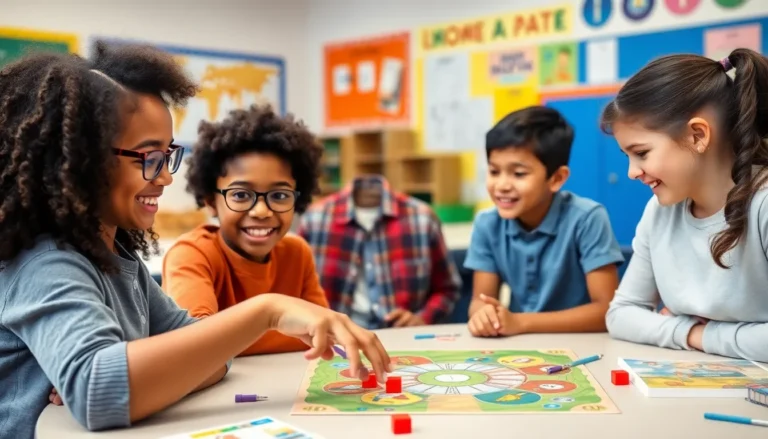Reading isn’t just a skill; it’s a magical journey that transforms curious little minds into avid bookworms. Imagine your child, once tangled in the chaos of letters, now gliding through stories like a pro. The five stages of reading development are like stepping stones on this enchanting path, each one unlocking new adventures and insights.
Table of Contents
ToggleOverview of the 5 Stages of Reading Development
The five stages of reading development guide children as they become proficient readers. These stages encompass the essential skills and knowledge they acquire during their journey.
- Stage 1: Awareness and Exploration
In this initial stage, children engage with books through listening and viewing. They explore illustrations, sounds, and text, building language skills and background knowledge.
- Stage 2: Early Reading
Children gradually develop phonemic awareness and begin to recognize familiar words. They start decoding simple texts, relying on pictures and context to make meaning.
- Stage 3: Reading to Learn
At this point, children transition from learning to read to reading to learn. They read with more fluency and comprehension, exploring different genres and absorbing information from various sources.
- Stage 4: Multiple Viewpoints
As children reach this stage, they can analyze text from different perspectives. They appreciate diverse viewpoints and can engage in discussions about themes, characters, and author’s intent.
- Stage 5: Construction and Reconstruction
The final stage sees children interpreting, synthesizing, and evaluating complex texts. They demonstrate critical thinking skills, creating their own narratives and responses to literature.
Each stage plays a crucial role in developing proficient readers. Parents and educators can support this progression by providing appropriate resources and engaging children in reading activities tailored to each developmental phase.
Stage 1: Pre-Reading

Pre-reading serves as a foundational stage in a child’s reading development. Engaging early with print sets the stage for future literacy skills.
Importance of Early Exposure
Early exposure to books fosters language acquisition and cognitive growth. Children benefit from listening to stories, which enriches vocabulary. Engaging with illustrations sparks curiosity and aids understanding. Studies indicate that children who encounter books before formal schooling perform better academically. Additionally, regular reading nurtures a love for storytelling and inspires imagination. This passion for reading often translates into enhanced comprehension and communication skills.
Activities to Encourage Pre-Reading Skills
Creating a literacy-rich environment supports pre-reading skills. Reading aloud to children captivates their attention and encourages interaction. Selecting picture books with vibrant illustrations engages their visual senses. Utilizing rhymes and songs helps develop phonemic awareness. Encouraging children to narrate stories based on the pictures enhances creativity and comprehension. Incorporating interactive activities, like puppet shows or storytelling sessions, makes reading enjoyable. Simple games that focus on letter recognition or sound awareness lay a strong foundation for future reading success.
Stage 2: Initial Reading and Decoding
Initial reading and decoding represent a pivotal moment in children’s reading development. During this stage, children begin to recognize words and connect sounds with letters, laying the groundwork for future reading success.
Characteristics of This Stage
Children at this stage typically demonstrate emerging phonemic awareness. They identify familiar words and depend on pictures for context clues. Recognition of simple words occurs frequently, enhancing confidence. Letter-sound relationships become clearer, fostering decoding skills. Children might read aloud with some fluency, but comprehension still requires support. Enjoyment of stories continues, encouraging exploration of various texts.
Strategies for Supporting Learners
Parents and educators can enhance skills through targeted activities. Encouraging daily reading practice fosters familiarity with text structures. Using phonics games solidifies letter-sound connections. Introducing engaging materials, such as picture books, keeps children’s interest piqued. Reading together allows for discussion, promoting comprehension. Offering praise for achievements boosts motivation. Incorporating interactive reading sessions enhances engagement and sparks a love for reading.
Stage 3: Confirmation and Fluency
Stage 3 of reading development focuses on confirmation and fluency, emphasizing a child’s transition from simple reading to more comprehensive understanding and enjoyment of texts.
Building Confidence in Reading
Confidence in reading emerges as children start to recognize and read a broader range of texts. At this stage, they often engage with books independently, enjoying stories and information that appeal to them. Building this confidence involves encouraging diverse reading materials, such as chapter books, magazines, and informational texts. Flexible reading practices also help children explore genres that excite them, fostering a sense of ownership over their reading journey. When kids discuss what they read with peers or adults, their understanding deepens, enhancing both their enjoyment and comprehension skills.
Recommended Practices for Fluency
Fluency becomes essential as children read more extensively and gain increased comprehension. Practicing reading aloud promotes familiarity with rhythm and intonation, fostering smoother reading experiences. Repeated readings of familiar texts, such as favorite stories or poems, aid in developing speed and accuracy. Incorporating guided reading sessions allows educators and parents to provide targeted support and feedback, reinforcing skills. Engaging children in discussions about texts enhances critical thinking and encourages connections between reading and their personal experiences. Diversifying reading activities, including puzzles or storytelling games, further enriches children’s reading skills and enthusiasm.
Stage 4: Reading for Learning
In this stage, children read to acquire knowledge and gain new insights. They connect various texts to enhance their understanding of the world around them.
Transitioning to Complex Texts
Complex texts provide challenges and opportunities for growth. As children engage with these materials, they develop skills to analyze and interpret nuanced ideas. The ability to navigate advanced vocabulary and articulate themes emerges during this phase. When children encounter unfamiliar genres, they expand their literary repertoire. Exposure to different writing styles, such as essays and reports, enriches their comprehension and critical thinking.
Skills Developed During This Stage
Critical thinking becomes prominent as children evaluate information and develop their perspectives. This stage fosters the ability to synthesize ideas from multiple sources, encouraging deeper understanding. Analyzing characters and themes promotes empathy and engagement with diverse viewpoints. Moreover, reading for learning enhances research skills, allowing children to gather relevant data efficiently. These skills lay the groundwork for lifelong learning and informed citizenship.
Stage 5: Reading for Inspiration and Growth
Stage 5 focuses on reading for inspiration and personal growth. At this level, readers seek deeper connections with texts, exploring complex themes and diverse perspectives. They engage with literature that challenges them and nurtures their creativity.
Encouraging Lifelong Reading Habits
Creating lifelong reading habits is essential for readers at this stage. Parents and educators can promote a culture of reading by providing access to a variety of genres and authors. Regular discussions about books fosters critical thinking. Encouraging participation in book clubs cultivates a sense of community and shared discovery. Celebrating reading milestones and setting personal goals enhances motivation and commitment. Equipped with these strategies, young readers develop a passion for literature that extends beyond the classroom.
Engaging Advanced Readers
Advanced readers benefit from exposure to challenging texts and multidisciplinary themes. Selecting books that align with their interests fosters enthusiasm for reading. Incorporating diverse narratives broadens their understanding of different cultures and experiences. Encouraging exploration of online resources and literary forums allows for deeper engagement with literature. Providing opportunities for creative expression, such as writing reflections or creating art inspired by reading, nurtures their personal connections to texts. These activities empower readers to embrace complex ideas while enhancing their analytical skills.
Understanding the five stages of reading development is vital for nurturing a child’s journey into literacy. Each stage builds upon the last, creating a solid foundation for lifelong reading habits. By recognizing where a child is in their reading journey, parents and educators can provide tailored support that enhances their skills and fosters a love for literature.
Encouraging exploration and engagement at every stage not only boosts confidence but also enriches critical thinking and comprehension. As children progress through these stages, they unlock the power of reading, transforming their curiosity into inspiration and personal growth. Supporting this journey cultivates not just proficient readers but passionate lifelong learners.



